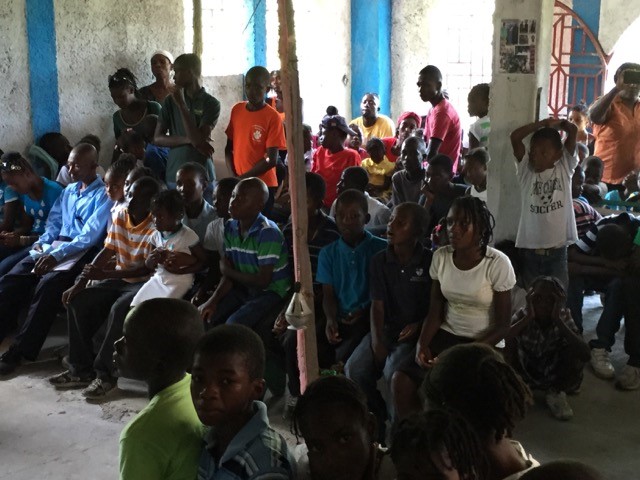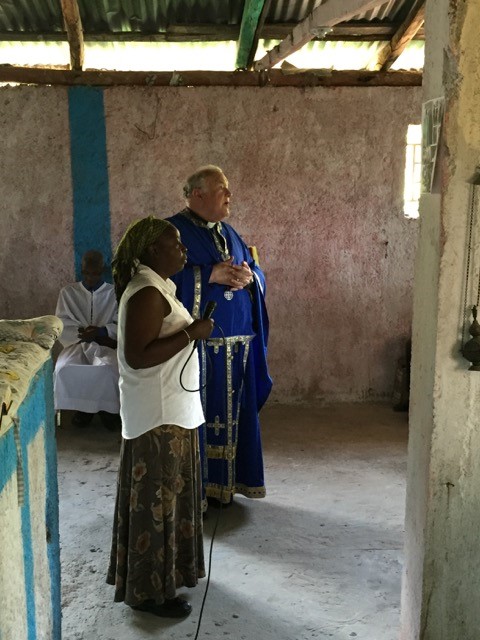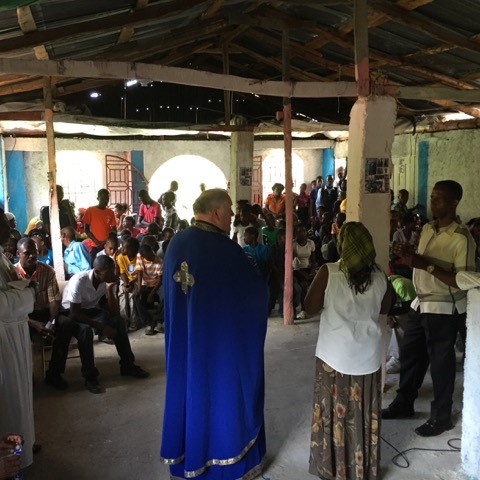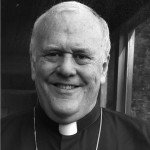Saint Matthias Eglise Anglicane, Diocèse d’International, Église Anglicane en Amérique du Nord, Léogâne, Haiti
When the earthquake hit Haiti in 2010, the epicenter was in Léogâne, not far from Port au Prince. Saint Matthias Anglican Church in Léogâne was almost at the very center of the worst damage. There was a four story school with between 200 and 300 students and a church building. By the time the earthquake and aftershocks stilled, all four stories of the school were reduced to a dusty pile of rubble. The church building was damaged, but still standing. There were holes in the roof and some of the interior walls collapsed, but it is still safe to occupy and is jam packed with worshipers every Sunday.
Now, five years later, the dust has settled, but there are still vast areas of destruction that have not yet been rebuilt. Saint Matthias is about a mile from the coastal road just East of where the quake was centered. They own a plot of land where the church and the school stood, though now, only the church stands. There is no electricity or water to the property. They installed a solar panel over the church, but something went wrong. Now, when they have services, they have to use a PA system that runs off an automobile battery that has been charged from someone’s generator. Still, the circumstances have not dulled the enthusiasm of worship or the devotion that the people have to the Gospel. Père (French for Father) Kalyld says, “It is all about the Gospel of Jesus and sharing that with people.”
Three months at a time, Father Kalyld goes to the US to work for a school board in Florida, living like a monk and socking away money for his return to Haiti where it is all used for his family and the church. Because the school fell down they had to find another place for the seven teachers and between 200 and 300 children. On the day I visited, they walked from the rented space to the church to visit with me and to have a communion service. Because their only priest is Père Kalyld, they can only have communion when he is there. The rest of the time, the deacons lead morning prayer and do discipleship with the congregation. The children were obviously excited for the adventure of the day to have a bishop present. I think they were also excited that people found a bunch of benches so they didn’t have to stand through the service.
The people use a liturgy in Creole, but many of them speak French as well. I preached in English and some French, the lady with the microphone, Hyacinth, translated into Creole. She is originally from Jamaica but lived more than twenty years in the US, so it was easy to communicate with her. In turn, she translated into Creole.
We have already approved a grant from Ekklesia to install one of the water filtration and bottling facilities, like the ones we have done in Africa.
Hopefully, we can find a source for the bottles and caps in Haiti, then the equipment can purify and bottle 6 half liter bottles each minute. The entire process from sterilizing the bottles, to filling them, installing the caps, and then covering the cap with a shrink-wrap safety seal can produce a tremendous amount of clean water that can be used and sold. Currently, bottled water sells for about 23 Gourde (about 50¢ a bottle). Imagine what an impact that can have for the church.
The International Diocese Archdeacon for Colorado, Phil Eberhart and his wife Valerie, have a wonderful side ministry with wedding gowns. Valerie is a seamstress who works on beautiful wedding gowns. They worked with the manufacturers of the gowns instead of destroying them, to donate them to be used overseas. They used to destroy them, but then figured out that brides in Kenya, Uganda, Rwanda, or now Haiti, were not likely to buy designer gowns in the US! Scores of dresses will be shipped to Haiti to set up a bridal gown rental company that the ladies of Saint Matthias can operate to make money for the church.
When the economy is in as bad shape as it is in Haiti, these kinds of projects are vital to underwriting ministry. While it is true that ongoing ministry can usually be maintained by people tithing, even when the economy is not robust, when there are environmental factors like floods, earthquakes, and storms, outside help plays a vital part. Haiti is currently in what I call the “awkward zone”—the needs are still great, but another crisis, or series of them, has captured public attention.
This parish and school are going to be part of the International Diocese of the Anglican Church in North America. From Saint Matthias, we will engage in a church planting effort to put in five new churches in each of the surrounding areas. It is a monumental undertaking, but it is worthy of the effort. Please pray for Père Kalyld, Saint Matthias, and the International Diocese to do all that we are designed to do.
Right now, the deacons and a Catechist are preparing people for confirmation. We should have between 50 and 100 confirmations to do by December. Please pray for all the precious people of Saint Mtthias, for their church to prosper and for them to be successful in reaching out to plant other churches in the surrounding area. Please pray, too, that we can navigate the government bureaucracy and get the necessary permits to get the water production going. Then we will have to work on a school building. And electricity. And security.
There is a new footprint for the Gospel. Circumstances have not been able to crush it. The people are ready. Now watch God do His work!
The Rt. Rev. Bill Atwood is Bishop of the ACNA’s International Diocese and an American Anglican Council contributing author.





